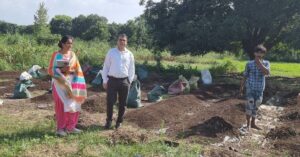Ex-Journo’s Org Helped Turn 30,000 Farmers Organic in Punjab, Revived Millets
Battling ignorance, the establishment, and sometimes even hunger, the Kheti Virasat Mission brought about an organic revolution in the heart of a Green Revolution 'success story'. #GrowOrganic
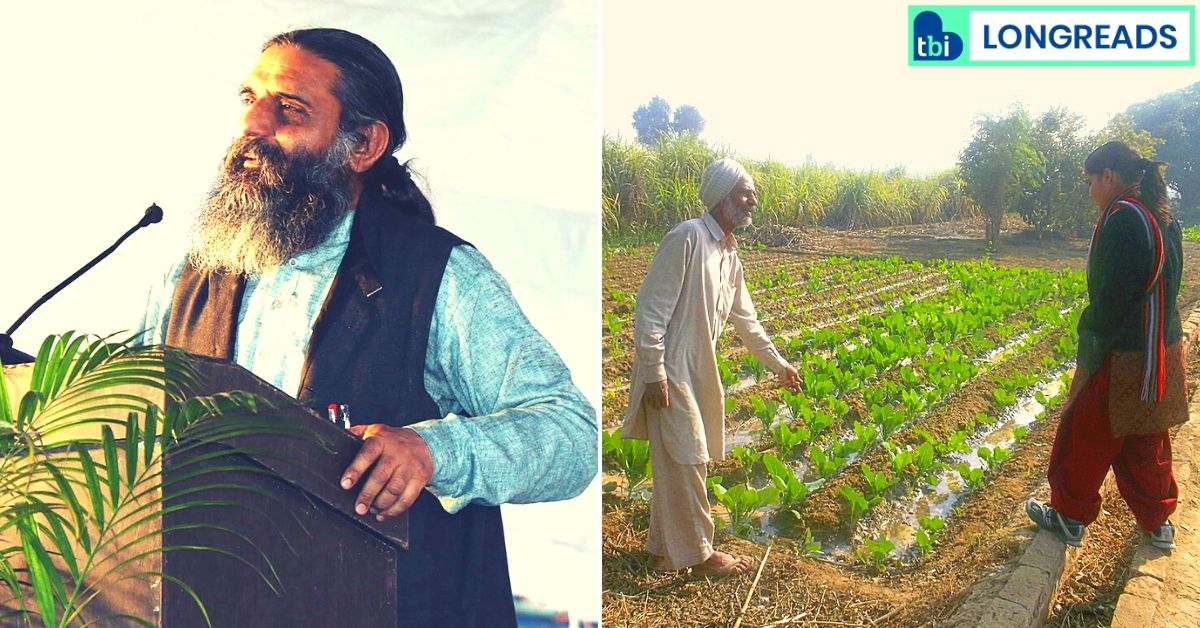
With The Positive Collective, The Better India’s COVID-19 coverage is available to regional language publications for free. Write to [email protected] for more details.
In the winter of 1996, Umendra Dutt, an editor with a Delhi-based news publication covering agriculture, met with farmers in Fazilka district, Punjab to discuss the benefits of organic farming and the adverse impact of Green Revolution. However, he was told by a participant up front that none of them had even heard about ‘organic farming’.
He received the same response in every informal meeting he went to in Abohar, Ferozepur, Patiala, Bhatinda and several other districts, and would later find out the reason—back then, Punjab did not have a single plot of land where organic farming was practised.
Lone Ranger
Punjab, the ‘Food Bowl of India,’ was a shining example of how the Green Revolution driven by heavy mechanisation, monoculture crops, chemical pesticides, artificial fertilisers, and high water consumption, made the country self-sufficient.
However, through his work in journalism since the early 1990s, Dutt had uncovered a darker dimension of the Green Revolution—from the rise in cancer cases in the region attributed to indiscriminate use of agrochemicals, rising costs of farming, destruction of soil cover, overexploitation of groundwater to a food chain and ecosystem contaminated by toxins.
He read reports published by the World Health Organization (WHO), sifted through government statistics, and met with people from a broad ideological spectrum ranging from Anupam Mishra of the Gandhi Peace Foundation to Dattopant Thengadi, the founder of Bharatiya Kisan Sangh, Vandana Shiva of Navdanya and journalist Devinder Sharma.
Dutt also read books like ‘One Straw Revolution’ by pioneering Japanese organic agriculturist Masanobu Fukuoka and interacted with some of the earliest practitioners of organic farming in India like Manohar Bhau Parchure, Suresh Desai, Dr. Claude Alvares and Dr. Preeti Joshi, among many others.
But more importantly, he spoke to farmers on the ground to understand how the Green Revolution model wasn’t working anymore.
“There were farmers who were suffocated by the farming model popularised by the Green Revolution but did not know how to articulate their concerns because it had attained a cult status in Punjab. In decades past, it had been propagated that the Green Revolution had saved India from famines, and everyone would die of hunger if chemicals were not used. Of course, more than three decades since its introduction, circumstances had changed significantly. However, the old romantic notions of the Green Revolution still dominated the public discourse on farming,” says Dutt, speaking to The Better India.
The facts on the ground more than negated these notions, but no one dared challenge the prevailing establishment.
However, Dutt decided to do exactly that. For nearly a decade following his first informal meetings in 1996, he expanded his network of grassroots farmers discussing the ill-effects of agrochemical based farming, and introduced the idea of organic farming.
“There were three things I had to achieve. One, win the confidence of the farmer. Two, despite having no background in agriculture science, I had to exhibit some organic farming techniques and present case studies of farming without chemicals. Finally, I had to articulate the adverse effects of chemical pesticides and agrochemicals. At the time, I had very few organic farming success stories except for a handful of farmers from Nagpur and Belgaum. Fortunately, assistance came from people in Toxics Link, Greenpeace and the likes of Ravi Aggarwal and Kavitha Kuruganti from the Alliance for Sustainable and Holistic Agriculture (ASHA), who helped us obtain contacts and ideas. Some of my friends from from the medical fraternity, who were studying the health problems arising out of chemical farming, also helped” recalls Dutt.
Of course, there were the naysayers, who questioned his motives without addressing the obvious concerns with the conventional model of farming. They would ask, ‘What’s your hidden agenda,’ ‘Why are you attacking India’s food security’ and ‘Is some Western nation paying you to destabilise the country?’
Entities from the agro-chemical industry started troubling him. He was subject to legal notices, court cases, derogatory letters calling him ‘anti-national’ and ‘anti-farmer’, while defamatory cartoons were published ridiculing him. Despite his critics, the evidence was overwhelming with two devastating news reports in 2002 shaking up the state.
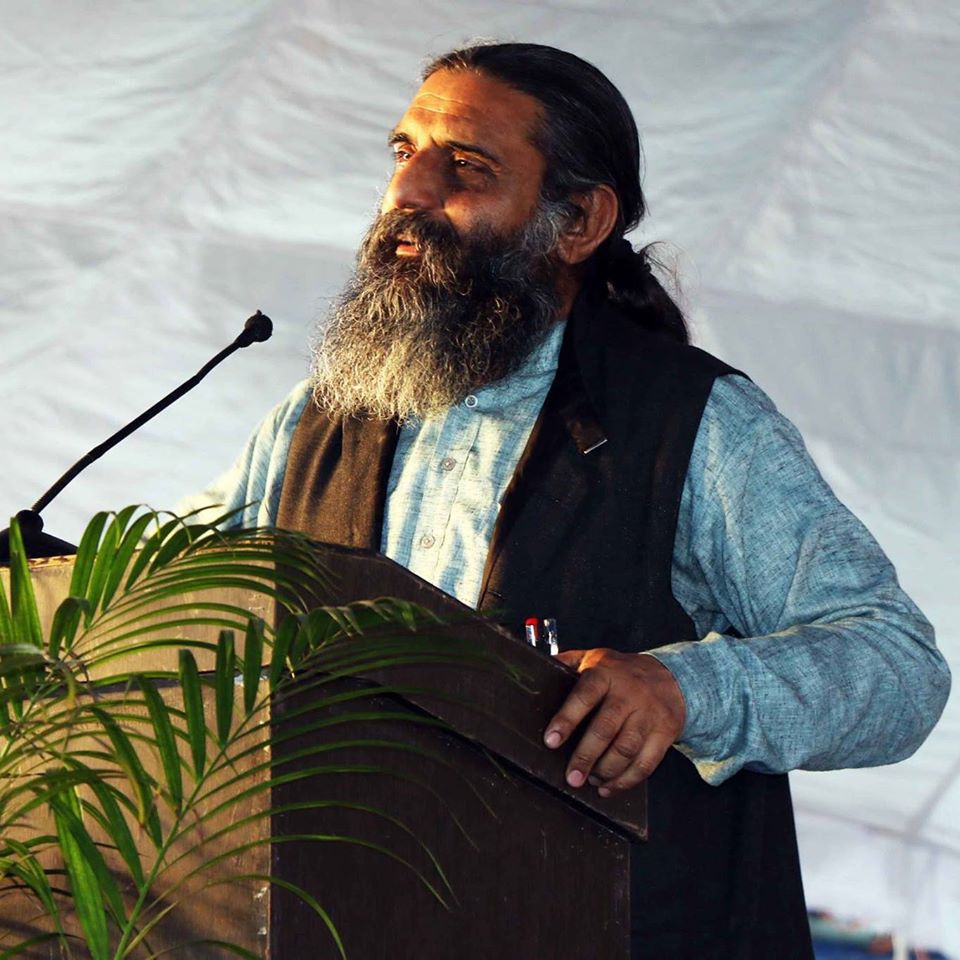
Turning points
In March 2002, stricken by massive debt and a water crisis, Bathinda’s Harkishan Pura village put itself up for sale. Yes, you read that right. Poverty-stricken residents of the village situated in the cotton belt of Malwa region put all their ancestral farmland on sale, hoping that the authorities would understand their desperation and alleviate their plight.
Meanwhile, Jarnail Singh, a retired government school teacher, exposed the abnormally high incidence of cancer deaths in his village of Jajjal in Bathinda district.
Over the course of a year, he had made a list of all deaths in his village and adjoining villages as well. He found that a significant proportion of them were cancer-related deaths emanating from indiscriminate use of agrochemicals.
Following the state assembly elections that year, he caught hold of the newly minted MLA who was on a tour of the villages. Singh showed him the list of cancer deaths and asked whether he knew why they were happening so frequently. A local journalist accompanying the MLA took an interest in what Jarnail had to say, spoke to him and published a report about cancer deaths in his village.
This made state-wide news, and there was a lot of hue and cry in the media alongside the village sale story.
These events helped Dutt articulate his concerns better.
“Instead of convincing vocal naysayers, I embarked on my journey and got together with people who understood my vision. By 2003-2004, a small group of farmers had come together around the idea of organic farming and started a few workshops on organic farming. However, what we did was bring subject experts from outside the state as well,” he says.
The first major expert they brought to the state was Advocate Manohar Bhau Parchure from Nagpur. He was both a practising organic farmer and lawyer. For a few weeks at a time, he was taken around the state where he met with small farmers and made a case for organic farming. His lectures and conversations compelled farmers to think about organic farming seriously. These discussions revolved around agriculture technology and flaws in the establishment’s understanding of agricultural science.
However, a major figure to address the health implications of chemical-based farming was Dr Shri Gopal Kabra, a renowned cancer surgeon from Jaipur.
He spoke to the medical fraternity across colleges and hospitals in the state about how chemical pesticides can cause cancer, have debilitating effects on reproductive health and results in autoimmune diseases. Thanks to his work, those in academia began taking the likes of Dutt and his fellow organic farming advocates far more seriously.
Since Dr. Kabra, others from the medical fraternity have also joined the organic movement like Dr. Amar Singh Azad, a community medicine expert, and oncologist Dr. Sachin Gupta, amongst others.
There were also three important reports in 2004/05 that also played a key role in turning the tide against chemical farming. First, a field study by Greenpeace on the health impacts of chemical pesticides by comparing Talwandi Sabo, where the consumption was particularly high and Anandpur Sahib, headed by Kavitha Kuruganti.
Second, there was an epidemiological study conducted by PGIMER, Chandigarh, headed by Dr JS Thakur, on high cancer rates in the Talwandi Sabo area of Bathinda district and Kiratpur Sahib. Finally, there was a Centre for Science and Environment (CSE) study on the presence of pesticides and cancer in Bathinda headed by Sunita Narian.
“Also, in expanding our network of farmers, the media played a significant part. For the media, this was a new narrative emerging out of the age-old Green Revolution discourse. Eventually, by 2005, I had already established informal networks with many farmers at a grassroots level, and this resulted in the creation of the Kheti Virasat Mission,” he says.
Kheti Virasat Mission
Registered as a charitable trust with its headquarters in Jaitu city, Faridkot district, in 2005, Dutt and a few friends founded the Kheti Virasat Mission (KVM) to protect farmers’ right to land, ensuring income security, a decent livelihood and agriculture sovereignty as well as protecting consumers’ right to safe and healthy food.
With an emphasis on organic farming, sustainable agriculture, enhancing depleting nutrition levels, biodiversity and revival of traditional food grains and crop diversity, KVM has played a critical role in facilitating a paradigm shift in how farming is understood in the state.
In 2005, KVM invited several experts from outside Punjab to demonstrate the finer techniques of organic farming to local farmers. At the outset, the emphasis wasn’t on matching the yield or income generated by conventional farming techniques, but on protecting health, ecology and enhancing sustainability.
“We helped them develop their techniques of organic farming based on conditions prevalent in Punjab and invited pioneering organic farmers like Suresh Desai, Subhash Sharma from Yavatmal, Maharashtra and Subhash Palekar from the Vidarbha region. Over a period of three years, farmers associated with the KVM developed their own model of organic farming based on climatic conditions in their region, and with time, it took off. If we had focussed on yield generation at the start, this would have never happened. Since then, both yield (with the initial exception of wheat which was recently addressed) and incomes have significantly increased,” recalls Dutt.
Nonetheless, this entire mission wasn’t without its early struggles. With no funding from governments and little from private organisations, they had to borrow from their friends, families and sometimes had no money for regular meals or paying rent. This struggle continued till 2008. However, once the farmers attained success in organic farming by evolving techniques suitable for Punjab’s climate and began talking about it, things began to turn around.
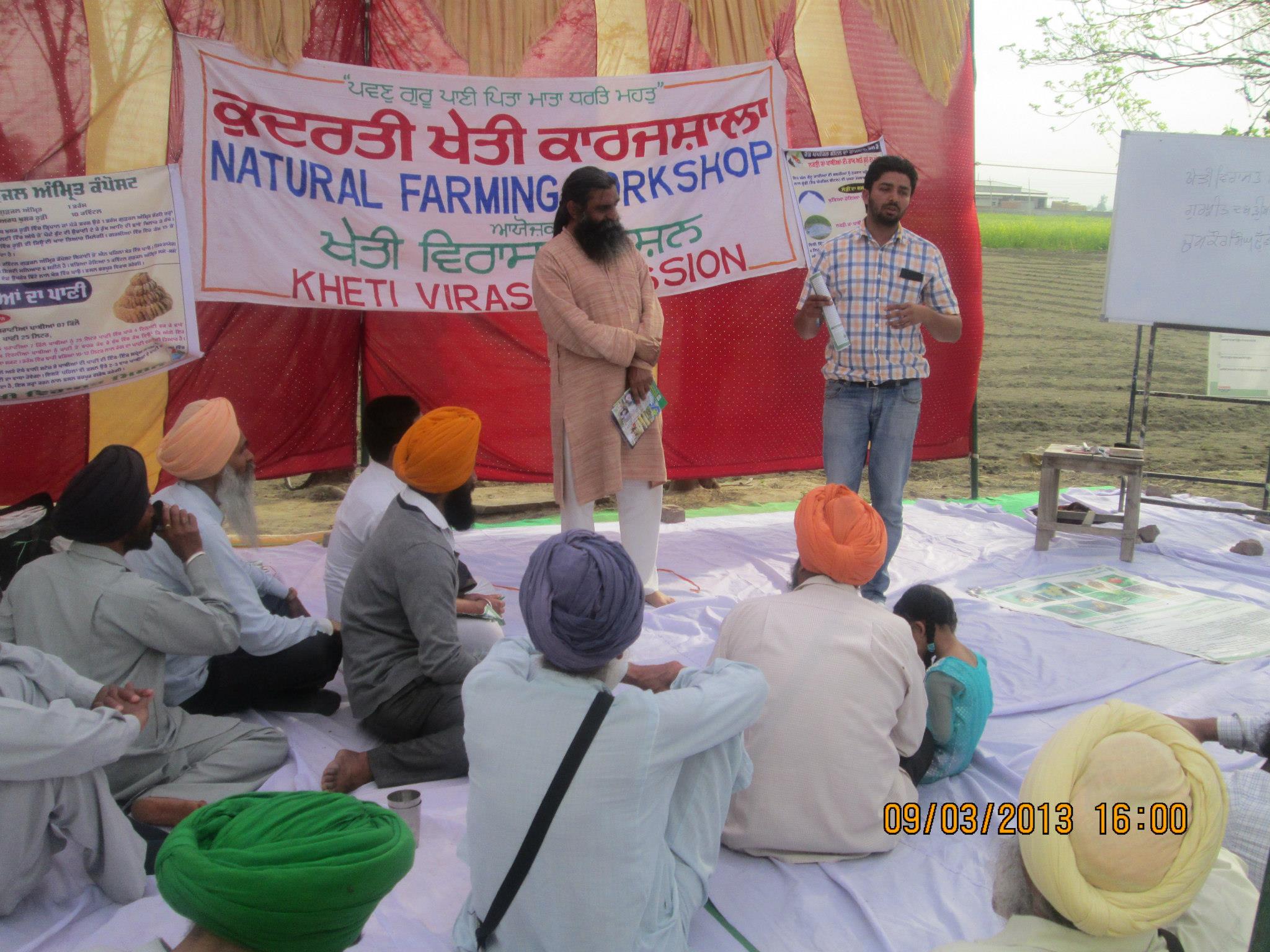
Impact
Kamaljeet Singh Hayer, a former top lawyer, who lost his father to a massive heart attack and 10-year-old brother to a brain tumour, was studying organic farming online when he came across the KVM website and called Dutt.
“Umendra had some eye-opening facts to share—how Punjab owned 1.5 per cent of the agricultural land in India, and yet, it used 18 per cent chemicals on its farms. He added that Punjab was a dying civilisation; there was no more an agricultural crisis but a struggle for survival. I couldn’t sleep that night. I wondered what I would do with Rs 1.5 lakh a month when I couldn’t use it to save my father or my brother. I am approaching 40, and if I didn’t do anything, my family and I would have a similar end,” he told The Better India last year.
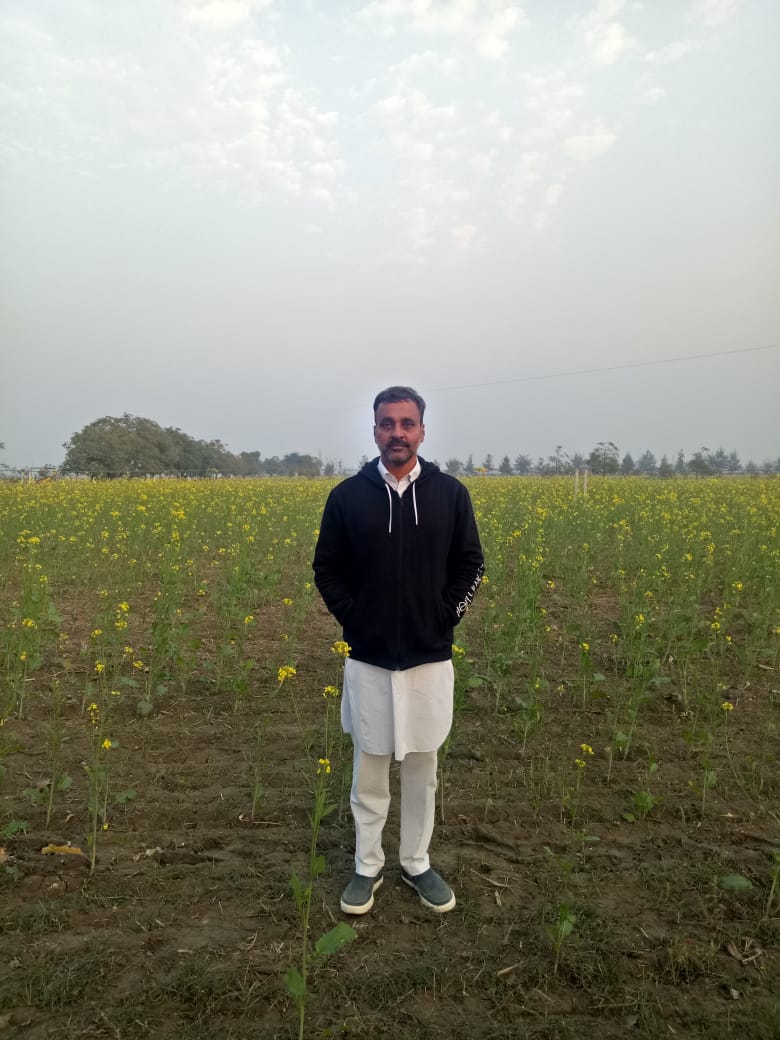
Upon Dutt’s suggestion, he attended a workshop organised by renowned agricultural scientist the late Dr Om Prakash Rupela from Hyderabad and an essential resource person for the KVM. In January 2013, after much convincing, Dr Rupela worked with Kamaljeet to revive his 20-acre ‘nearly dead’ patch of land in the village of Sohangarh (Rattewala) near Guru Harsahai town in Ferozepur district.
Following inputs from other organic farm experts like Shubhash Palekar and Deepak Sachdev, he created a workable farm model in six months.
Although Dr Rupela passed away due to cancer in 2015, Kamaljeet persevered, and after a lot of trial and error over five years, his unique farm model came to life. Today, the farm boasts of 1,500 trees of 120 different species. The rest of the farmland is used to grow and harvest more than 50 seasonal crops every year.
“He also processes finger millet to make biscuits that are sold at Rs 500 per kg, black gram is converted into besan (gram flour) or bhujiyas, and wheat is served in the form of porridge or vermicelli. In addition to selling fruits directly, he also converts them into jams and pickles,” adds The Better India report.
Ravdeep Singh from Farwahi village was a farmer who aggressively used chemicals and heavy machinery on his six-acre farm. He wanted high yields and greater profits, but that came saddled with a lot of debt. In August 2009, his world turned upside down when he got the news that his mother was diagnosed with cancer. She passed away in 2011.
“All the blood drained out of my face that day. I was thinking about what I would do with all the money when the pesticide I was adding to gain the profits was poisoning people, including my own family. I felt so guilty. I knew there was no other alternative, so I had to change. I no longer wanted to be the cause of cancer in others. It was a big switch, but I was ready for it,” he told The Better India last July.
After his mother’s passing, he shifted to organic farming and attended a couple of KVM workshops as well. On six acres, Ravdeep today grows cereals, pulses, lentils, leafy greens, spices, 15 types of seasonal vegetables and more than 20 varieties of fruits.
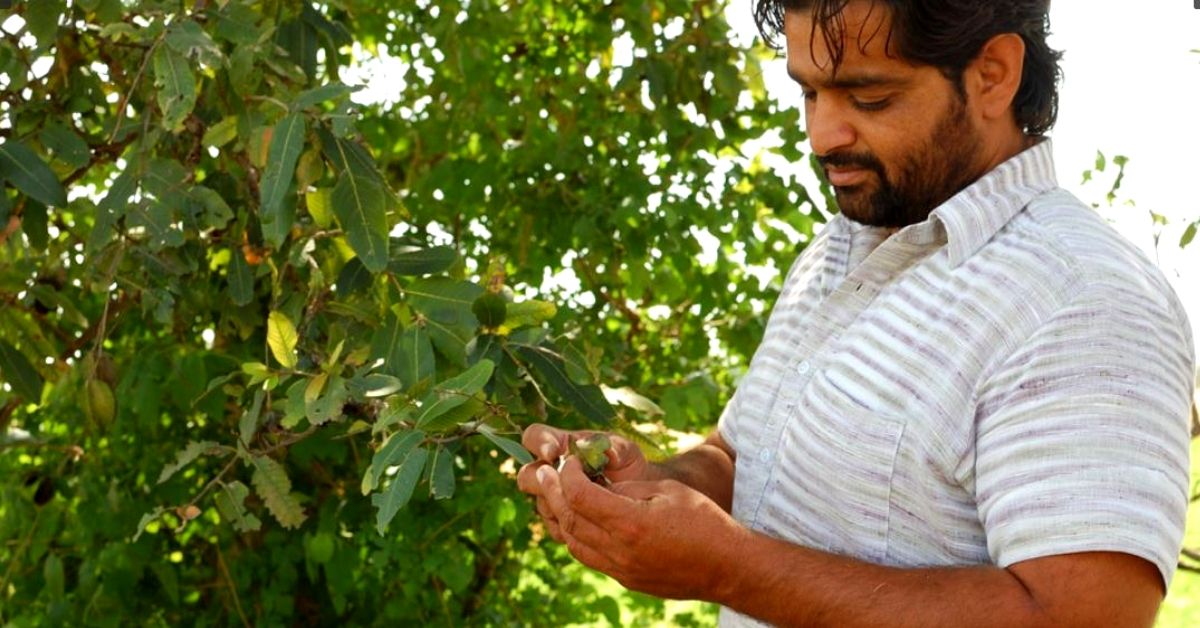
Organic Kitchen Garden For Women
In 2010, KVM started organic kitchen gardening in villages. Since many male farmers weren’t very inclined towards organic farming, they began reaching out to their wives. It started with four villages with 80 women but has grown to more than 60 villages, and 6,000+ kitchen gardens in three districts.
At least 2,000 women from villages in Punjab have turned into entrepreneurs from organic farmers. Most of these women used to be housewives until then. A large percentage of the 2,000 women are in Bathinda, Barnala, Sangrur and Mansa, while their husbands are small farmers. Many of them are also from Scheduled Caste communities who used to work at the homes of high caste ‘Jat’ Sikhs of their villages but are now making their own living.
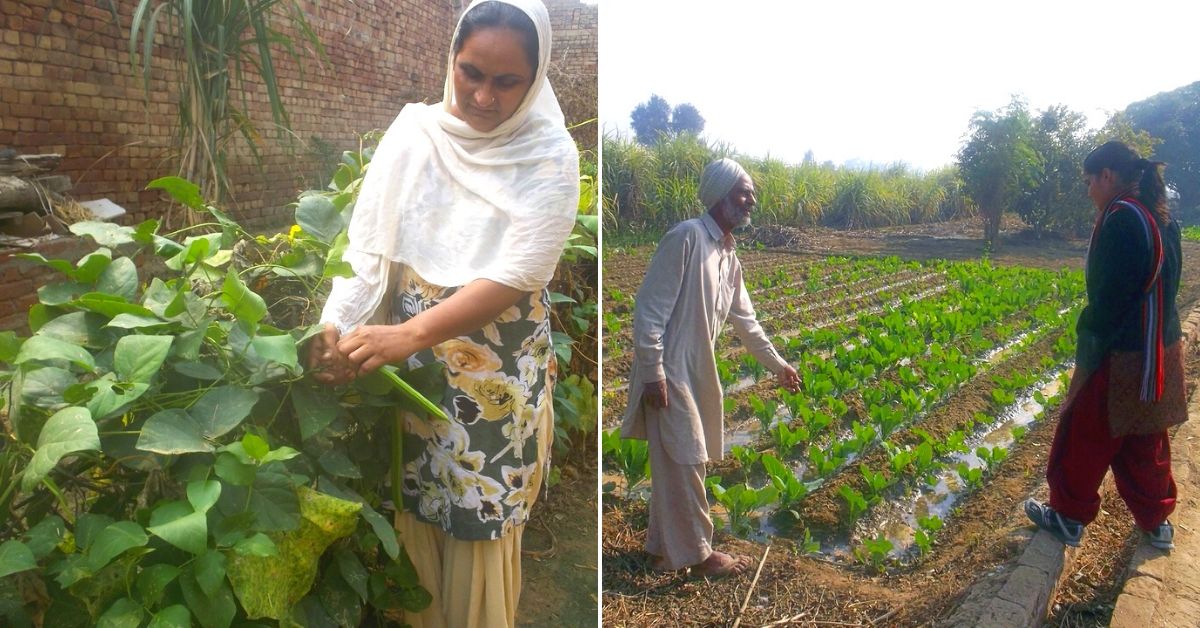
“The family not only gets nutritional security but supplemental income as well. We started training women from landless families, the Scheduled Caste communities and brought them in-house nutritional security, income and increased savings. Moreover, they are earning cash, and thus allowing many landless family women to earn their own money say Rs 100-150 daily instead of their husbands squandering it on alcohol. This has brought dignity to these women from very low-income families who today grow veggies in their back gardens and small courtyards. Once husbands started seeing their wives growing vegetables in their kitchen gardens without using a single drop of chemical, they also issued their support in large part despite stiff opposition earlier,” says Dutt.
Besides workshops for aspiring organic farmers, KVM also runs Farmer Field Schools. This is a novel concept where hands-on training is given to interested farmers who wish to adopt organic farming. Over 1000 of these ‘Schools’ are present across the state. The training happens on the field of a master trainer.
“We have taught about 30,000 farmers, including men and women. These schools don’t run around the year but are operated voluntarily by successful organic farmers. These were first established in 2012,” informs Dutt. The organisation has even trained over 500 farmers in the practice of seed conservation and established family seed banks as well.
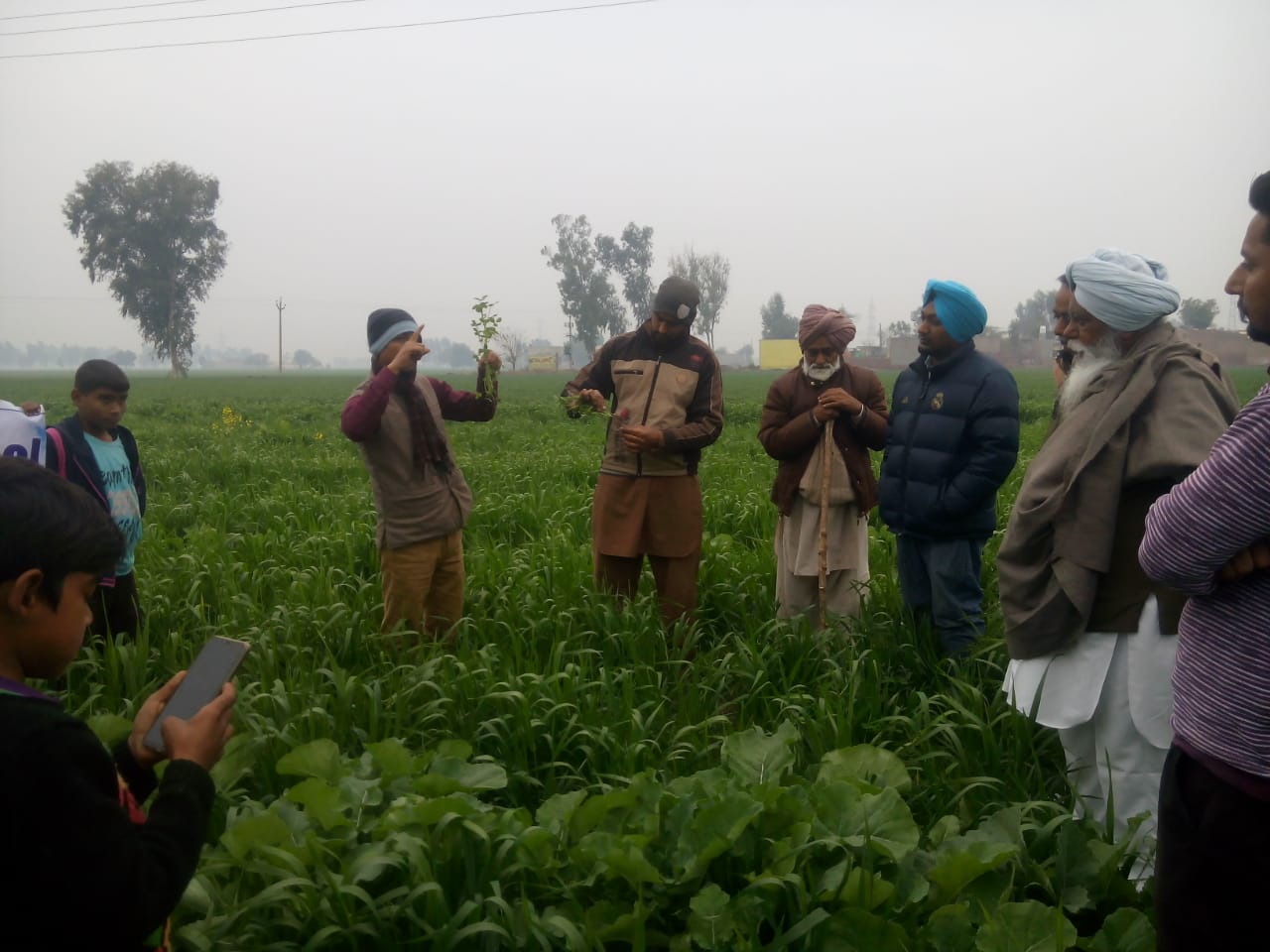
One of KVM’s main activities is the two-day training workshop they have been conducting since 2005, for aspiring organic farmers. There, they are trained in areas like kitchen gardening, mushroom cultivation, pest management, seed conservation, millets growing, etc.
From the Farmer to the Consumer
Providing farmers and consumers with a platform where they can directly interact with one another without the involvement of any middlemen is what gives them total ownership of their produce. These outlets, called Kudrati Kisan Haats, are run every week in cities like Abohar, Faridkot, Jalandhar, Bathinda, Ludhiana, Batala, Gurdaspur, Muktsar, Barnala, Kotkapura, Sangrur and Amritsar.
These markets first began in 2015 once KVM had the necessary diversity of products and a large network of farmers.
They also established networks with organic farmers in south India and brought in spices grown there like black pepper and vegetables not grown in Punjab. At the Kudrati Kisan Haats farmers would bring their produce, and consumers would directly buy from them.
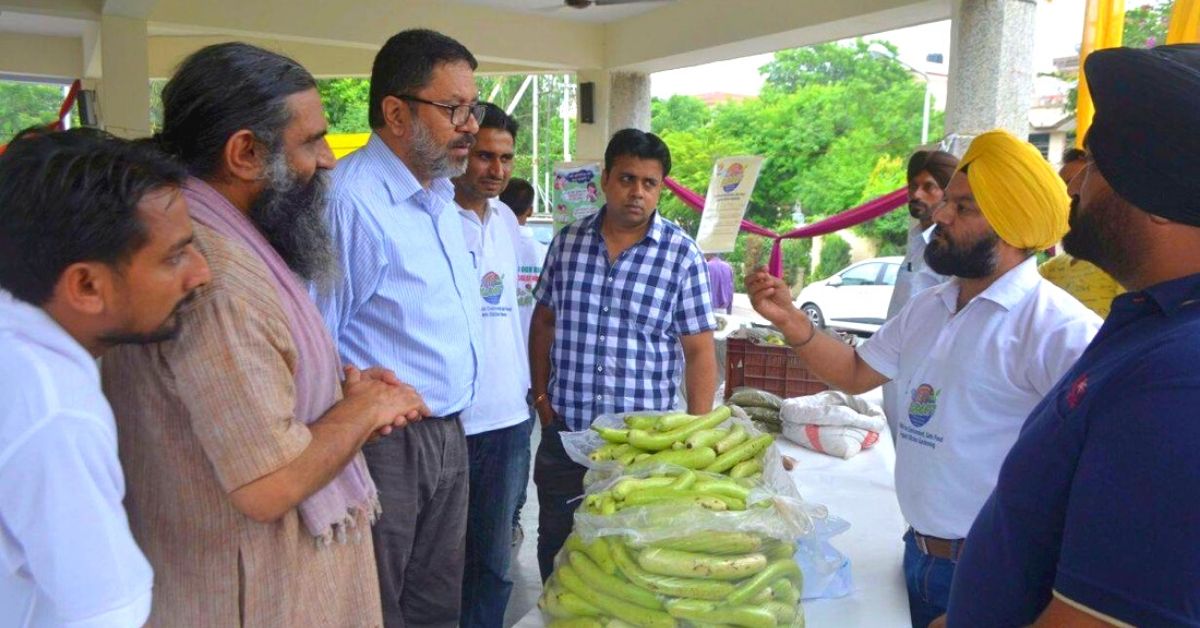
There are a good number of shops running in Punjab that are either directly associated with KVM or independently managed. These shops are a collaborative effort between consumers and farmers.
“Consumers are also part of shop management. They are involved in the quality control process checking on farmers, their produce and farms as well to ensure the authenticity of the product. See, there are a lot of loopholes in the official certification process. So, we employed a Participatory Guarantee System. KVM is registered as one of the ‘Regional Council’ empowered by Govt. of India to implement the PGS scheme. Under this, over 1000 acres of land is now under organic cultivation, and over 250 farmers from 17 districts are under the certification process. Consumers are volunteers with our organisation. More than 100 people first came to us as consumers, and within a few months, they became volunteers,” informs Dutt.
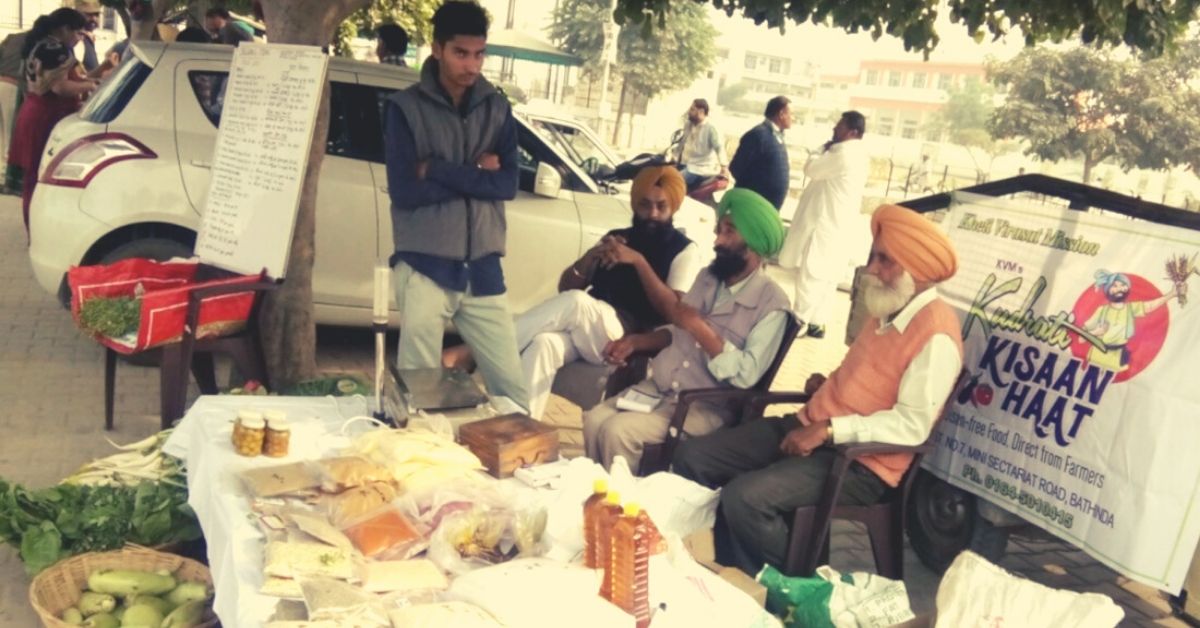
Tradition & Legacy
One of the standout achievements of KVM has been the revival of traditional millets as against a monoculture system dominated by rice and wheat.
“This entire category of food grains vanished from Punjab due to the support price system of the government. After many years, over 50 farmers are now growing Raagi, Bajra, Kangni, Kodra and Jowar again in their field. [We] helped change the narrative of state agriculture to recognise the harmful effects of pesticides, and to focus on sustainable and regenerative farming (Nanak Kheti),” says an in-house document issued by KVM.
Under the guidance of KVM, many farmers across across several districts have taken to millet cultivation to break away from the paddy-wheat cycle. One farmer in Fazilka has sown millet on over 8 acres of land. Requiring 70 per cent less water as compared to paddy, the millet was once an integral part of Punjabi cuisine. Moreover, it was the first organisation in the country, if not the state, to bring doctors and medical professionals into the organic farming movement, and thus establishing why consumers must pay attention to how food travels from farm to plate.
Thanks to its influence, many people have also left their lucrative jobs in cities to become successful organic farmers.
Conclusion
KVM’s long list of achievements cannot be fit into one article, but what it has essentially done is a build a successful and alternative narrative to the Green Revolution in less than 35 years. From a time, when the establishment sneered at the efforts of Umendra Dutt, today many farmers in Punjab are wholeheartedly embracing it, although he believes agriculture universities have some way to go.
“The success of organic farming in Punjab today is thanks to the blood, sweat and tears of our farmers. Thousands have sacrificed their happiness, convenience, money, time and even relationships to ensure its success. These farmers are our lighthouses and ray of hope. Whosoever is eating food today, they are indebted to these farmers.” says Dutt.
(You can follow Kheti Virasat Mission on Facebook and YouTube as well.)
(Edited by Gayatri Mishra)
Like this story? Or have something to share? Write to us: [email protected], or connect with us on Facebook and Twitter.
If you found our stories insightful, informative, or even just enjoyable, we invite you to consider making a voluntary payment to support the work we do at The Better India. Your contribution helps us continue producing quality content that educates, inspires, and drives positive change.
Choose one of the payment options below for your contribution-
By paying for the stories you value, you directly contribute to sustaining our efforts focused on making a difference in the world. Together, let's ensure that impactful stories continue to be told and shared, enriching lives and communities alike.
Thank you for your support. Here are some frequently asked questions you might find helpful to know why you are contributing?


This story made me
-
97
-
121
-
89
-
167




